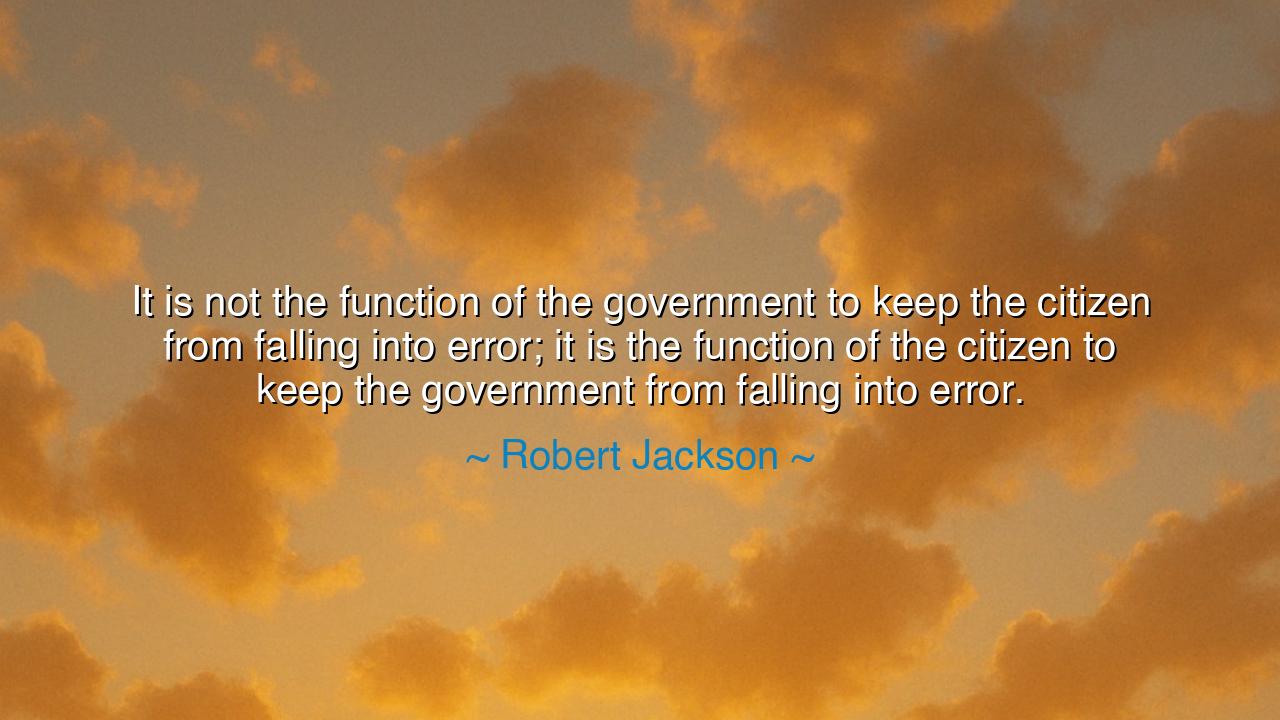
It is not the function of the government to keep the citizen from
It is not the function of the government to keep the citizen from falling into error; it is the function of the citizen to keep the government from falling into error.






"It is not the function of the government to keep the citizen from falling into error; it is the function of the citizen to keep the government from falling into error." Thus spoke Robert H. Jackson, a man who stood at the crossroads of justice and history — a Supreme Court Justice of the United States, and a chief prosecutor at the Nuremberg Trials, where the crimes of tyranny were laid bare before the eyes of the world. In this declaration, Jackson forged a timeless truth: that the duty of government is not to rule the hearts and minds of men, but to serve them; and that the duty of the citizen is not blind obedience, but eternal vigilance. For when the people forget this sacred balance, liberty itself begins to crumble.
Jackson’s words arose in the shadow of the 20th century’s great darkness. He had seen firsthand what happens when citizens surrender their power of judgment to those who claim infallibility. In Nazi Germany, millions had trusted the state to define right and wrong — to tell them what to believe, whom to follow, and whom to hate. The result was catastrophe: a world set aflame, and a civilization shamed by its own silence. From that fire, Jackson emerged with a conviction carved in moral stone: that error in the hearts of men is dangerous, but error in the hands of government is fatal. For when a government presumes to protect its people from “wrong thinking,” it inevitably seeks to control what they think — and that path leads not to safety, but to slavery.
The meaning of Jackson’s quote is thus both simple and profound. In a free society, every person must be permitted to err, to doubt, to question, to disagree. The role of government is not to mold its citizens into perfect beings, but to protect their right to search for truth — even if that search leads them through error. The people’s freedom to be wrong is part of their freedom to be right. But the government, bound by power and consequence, must be held to a higher standard. It is the citizen’s sacred duty to ensure that the state remains within the bounds of justice, truth, and humility. For the moment government begins to believe itself incapable of error, it becomes the very tyrant it was created to restrain.
Consider the tale of ancient Athens, cradle of democracy and thought. There, the people once placed their faith in law — but also their responsibility in conscience. Yet in a tragic hour, they forgot Jackson’s principle long before it was spoken. They condemned Socrates, not for crime, but for thought — for daring to question, to challenge, to lead others toward wisdom through doubt. The Athenian state sought to “protect” its youth from error by silencing the philosopher. But in silencing him, it destroyed a piece of its own soul. Thus was born one of history’s greatest paradoxes: that the defense of truth through censorship destroys truth itself. In that lesson, Athens stands forever as both teacher and warning — that the freedom to think wrongly is the foundation of the freedom to think rightly.
In the centuries that followed, this truth has echoed again and again. The Founders of the American Republic, who knew the perils of monarchy and tyranny, built a government of limits, not absolutes. They wrote a Constitution that entrusted power not to kings, but to the people — and with that power came responsibility. “Eternal vigilance,” said another great voice, “is the price of liberty.” Jackson’s words are the continuation of that same creed: that it is the people who must guard their government, question its motives, and correct its course when it strays. To neglect this duty is to invite the slow decay of freedom under the guise of order.
Jackson’s insight also pierces into the heart of the modern age. In times of fear — of war, of crisis, of division — governments often claim they must protect citizens from dangerous ideas or harmful speech. Yet every law that silences a voice, every decree that limits thought, becomes a small betrayal of the republic’s founding promise. A nation that forbids its citizens to err soon forbids them to think; and a people who cease to think for themselves soon cease to be free. The citizen, therefore, must remain awake — not to destroy government, but to preserve its righteousness.
The lesson, then, is this: true freedom is not the gift of government, but the labor of the governed. It is the duty of every man and woman to hold power accountable — to question with respect, to dissent with courage, and to defend the rights of others as fiercely as their own. Let no citizen surrender this burden, for in its neglect lies the seed of tyranny. The government may guide, it may protect, but it must never presume to dictate conscience. Only the free mind, questioning and imperfect, can build a nation worthy of endurance.
So remember the wisdom of Robert H. Jackson: that the republic’s greatest safeguard is not in its rulers, but in its citizens — in their courage to speak, to doubt, to resist injustice when they see it. For the true function of the people is not submission, but stewardship. Let each generation, therefore, guard the light of reason from the shadows of power, lest liberty — that fragile, radiant flame — be extinguished not by the hand of the tyrant, but by the silence of the free.






AAdministratorAdministrator
Welcome, honored guests. Please leave a comment, we will respond soon